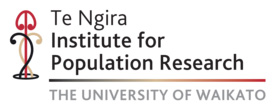2020 NIDEA Seminar Series
Dr. Jesse Whitehead
Tuesday 24th November
1pm
You tube link: https://youtu.be/BFKxxgR1_1A
Presentation abstract
 Equitable access to services is a guiding principle of the New Zealand Health Strategy. However, not all New Zealanders have ready access to primary health care. Adult residents ofthe Waikato region, and in particular Māori, have higher levels of unmet need for primay care than other New Zealand adults. This may influence health outcomes and exacerbate inequities as people with poor access to health care are less likely to use those services. Furthermore, although New Zealanders are generally living longer, there are also considerable differences in health outcomes between population subgroups, with non-Māori expected to live six to seven years longer than Māori or Pacific New Zealanders. The causes of these inequities include differences in access to the social determinants of health such as education, employment, and housing, as well as differences in access to health care and the quality of care received. The health system is also a social determinant of health that plays a role in creating, perpetuating, and exacerbating health inequities. Therefore, ensuring the spatial equity of health care is one important step in achieving health equity. Although the importance of distributing services according to need is widely recognised, in many health systems equitable access is not achieved, and in 1971 Julian Hart described the inverse care law whereby “the availability of good medical care tends to vary inversely with the need for it in the population served”.
Equitable access to services is a guiding principle of the New Zealand Health Strategy. However, not all New Zealanders have ready access to primary health care. Adult residents ofthe Waikato region, and in particular Māori, have higher levels of unmet need for primay care than other New Zealand adults. This may influence health outcomes and exacerbate inequities as people with poor access to health care are less likely to use those services. Furthermore, although New Zealanders are generally living longer, there are also considerable differences in health outcomes between population subgroups, with non-Māori expected to live six to seven years longer than Māori or Pacific New Zealanders. The causes of these inequities include differences in access to the social determinants of health such as education, employment, and housing, as well as differences in access to health care and the quality of care received. The health system is also a social determinant of health that plays a role in creating, perpetuating, and exacerbating health inequities. Therefore, ensuring the spatial equity of health care is one important step in achieving health equity. Although the importance of distributing services according to need is widely recognised, in many health systems equitable access is not achieved, and in 1971 Julian Hart described the inverse care law whereby “the availability of good medical care tends to vary inversely with the need for it in the population served”.
In this seminar, Jesse Whitehead will present key findings from his PhD research into the spatial equity of GP services in the Waikato DHB region. This research is based on a mixed methods approach which combines a quantitatve geospatial analysis of service accessibility with a qualitative analysis of in-depth interviews with key informants representing patients, doctors, and health organisations in the Waikato region.
Bio
Jesse Whitehead is a health geographer at the University of Waikato. His research examines the accessibility, sustainability and spatial equity of health services. He is currently working on a collaboration with the University of Otago to develop a rural-urban geographic classification that is fit for health research and policy purposes.
Family economic and social wellbeing during and after the nationwide Alert Level 4 lockdown
Dr. Kate Prickett
Tuesday 20th October
1pm
zoom: https://vuw.zoom.us/j/94722658547?from=msft
video link: https://youtu.be/d-3a8MyxCNg
Presentation abstract
 On March 25th, Aotearoa NZ moved quickly into an Alert Level 4 lockdown, a state which severely restricted people’s movement and their social interactions in an attempt to limit the spread of Covid-19. The lockdown represented an unprecedented experience for New Zealanders in two important ways. First, it set in motion a sudden and large drop into economic recession. Second, people were asked to severely limit their movements, social interactions, and the ways they went about organising and providing for their households. These factors raised fears about the economic and social impact of lockdown.
On March 25th, Aotearoa NZ moved quickly into an Alert Level 4 lockdown, a state which severely restricted people’s movement and their social interactions in an attempt to limit the spread of Covid-19. The lockdown represented an unprecedented experience for New Zealanders in two important ways. First, it set in motion a sudden and large drop into economic recession. Second, people were asked to severely limit their movements, social interactions, and the ways they went about organising and providing for their households. These factors raised fears about the economic and social impact of lockdown.
In this seminar, Dr. Kate Prickett will present key findings about the impact of lockdown on family wellbeing, including the economic impact on families, time demands and work-family conflict, and the toll on relationships and wellbeing. These patterns will be examined with a lens trained on the differential impact by gender and socioeconomic status. Data came from the Life Under Lockdown Survey—a unique dataset consisting of 2,000 New Zealanders who were asked about their economic and socioemotional wellbeing during week 3 (April) of the Alert Level 4 lockdown and were followed-up with again in July when New Zealand had transitioned back to Alert Level 1.
Bio
Dr. Kate Prickett is the Director of the Roy McKenzie Centre for the Study of Families and Children at Victoria University of Wellington. As a family demographer, Kate’s research is focused on how the the connection between family contexts and children’s health and wellbeing is implicated in the intergenerational transmission of inequality. A particular emphasis of this research is to understand how interpersonal processes between parents and children are embedded within a complex array of proximate ecological settings (such as work and child care) and broader systems of stratification (e.g., gender, socioeconomic status).
Contextualising trends in baby removals in Aotearoa New Zealand: international patterns, inequalities, policy trends and practice logics
Associate Professor Emily Keddell
Wednesday 29th July
1pm
zoom: https://otago.zoom.us/j/8366496535?pwd=4CH1MgjkCSs
video link: https://youtu.be/FLUPc196mf8
Presentation abstract
The number of babies removed at or soon after birth in Aotearoa New Zealand increased by 33% between 2015 and 2018, despite a reduction in all-age entries to fostercare. When the increase is broken down by ethnicity, it’s clear that it is almost exclusively comprised of Māori babies, while other ethnic groups remain stable. This pattern shows increasing inequities in the chances of child protection system contact for Māori, but there are intersecting inequalities particularly with socio-economic status and region that add nuance to this pattern. The data also suggest a growing authoritarianism in the nature of intervention. There are more legal orders used to enact removal, and more orders made during pregnancy rather than after birth, reflecting an increasingly adversarial approach based on notions of 'pre-emptive risk'. This talk discusses these trends with reference to international trends, inequalities concepts, policy discourse and practice logics. Similar trends are occurring in other nations, and with similar inequities. Dominant discourses of the 2015 policy reforms including social investment, being ‘child centred’ and early intervention heightened an individualized conceptualisation of babies at the expense of their parents or wider family and whānau contexts. Practice logics that rely heavily on recorded histories of systems contact, and pre-emptive risk, yet exclude social context, family and whanau capabilities, and disconfirming evidence contribute to heightened interventionism. These processes can lead to ‘thin’ assessment practices that create confirmation bias, particularly for Māori. At the same time, issues such as family poverty and inadequate support services can contribute to real risks for women and their families facing significant life challenges. Against the long backdrop of colonisation and the substantial social gradient in child protection system contact, grappling with these issues is imperative in order to reduce inequities going forward.
Bio
Emily Keddell is an Associate Professor in Social and Community Work at the University of Otago. Her research focusses on the child protection system, specifically inequalities in system contact, decision-making variability, knowledge interpretation in practice, the use of algorithmic decision tools, and policy analysis. She is currently engaged in a project examining what helps prevent babies being removed from their families of origin.
Hometown and whānau, or big city and millennials? The economic geography of graduate destination choices in New Zealand
Emeritus Professor Jacques Poot (joint work with Arthur Grimes, Shaan Badenhorst, David C. Maré and Isabelle Sin)
Tuesday 10 March
1.10pm
K.G.09 (University of Waikato)
Presentation abstract
One of the main challenges facing non-metropolitan regions is the attraction and retention of highly-educated young people. A loss of the brightest can lead to reduced business creation, innovation, growth and community wellbeing in such regions. We use rich longitudinal microdata from New Zealand’s integrated administrative data infrastructure to analyse the determinants and geography of the choice of destination of tertiary educated (university and polytechnic) graduates. We address the question of post-student location choice in the context of the approach of Chen and Rosenthal (2008) who introduced a methodology for calculating ‘quality of life’ and ‘quality of business’ indicators for urban areas reflecting consumption and productive amenities respectively. Specifically, we test whether students – of different characteristics (e.g. institutional type and field of study) – locate in places that are regarded as good to live or good to do business. Our estimates are conditional on students’ prior school (home) location and the location of their higher education institution. We find that graduates are attracted to locate in places that have high quality production amenities. High quality consumption amenities have heterogeneous effects on the location choice of students. Creative Arts and Commerce graduates are relatively more likely to locate in places that are attractive to business, consistent with a symbiosis between bohemians and business. Places can leverage their existing (productive or consumption amenity) strengths to act as drawcards to recent graduates. The results are important for local decision-makers who wish to know which factors can attract and retain young qualified people.
Bio
Jacques Poot is an Emeritus Professor at NIDEA and an Honorary Professor in the School of Accounting, Finance and Economics at the University of Waikato. He is also a Visiting Professor in the Department of Spatial Economics at Vrije Universiteit (VU) Amsterdam. His university education was at VU (Doctorandus, econometrics, 1978) and at Victoria University of Wellington (PhD, labour economics, 1984). He was previously a Foreign Professor at the University of Tsukuba in Japan (1994-97 and 2002), employed in various academic positions at Victoria University of Wellington between 1979 and 2003, and Professor of Population Economics at NIDEA, 2004-2017. Jacques is a Fellow of several professional organisations, including Academia Europaea, Regional Science Association International and IZA – Institute for the Study of Labor, Bonn. He is also an Affiliate of Motu Economic and Public Policy Research in Wellington. Jacques was the 2013 recipient of the NZIER Economics Award, which recognises sustained research excellence in work that makes a significant contribution to informing public policy in New Zealand.
